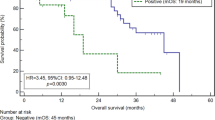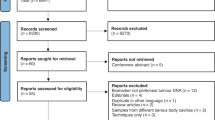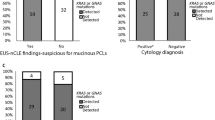Abstract
Detection of peritoneal dissemination (PD) in gastric cancer (GC) patients remains challenging. The feasibility of tumor-guided cell-free DNA (cfDNA) detection in prospectively collected peritoneal fluid (ascites and peritoneal lavage) was investigated and compared to conventional cytology in 28 patients. Besides conventional cytology, next generation sequencing was performed on primary tumor DNA and cell-free DNA from peritoneal fluid. Patients were retrospectively grouped into: a positive group (with PD) and a negative group (without PD). Detectable mutations were found in the primary tumor of 68% (n = 19). Sensitivity of PD detection by tumor-guided cfDNA analysis was 91%, compared to 64% by conventional cytology. Within the positive group (n = 11), tumor-guided cfDNA was detected in all patients with ascites samples (4/4, 100%) and in 86% (6/7) of the lavage samples, opposed to 4/4 (100%) patients with ascites and 43% (3/7) with lavage by conventional cytology. Within the negative group (n = 8), conventional cytology was negative for all samples. In two patients, tumor-guided cfDNA was detected in peritoneal lavage fluid. Interestingly, these 2 patients developed PD within 6 months, suggesting a prognostic value of tumor-guided cfDNA detection. This study showed that tumor-guided cfDNA detection in peritoneal fluids of GC patients is feasible and superior to conventional cytology in detecting PD.
This is a preview of subscription content, access via your institution
Access options
Subscribe to this journal
Receive 50 print issues and online access
$259.00 per year
only $5.18 per issue
Buy this article
- Purchase on Springer Link
- Instant access to full article PDF
Prices may be subject to local taxes which are calculated during checkout




Similar content being viewed by others
Data availability
The data generated in this study are available upon request from the corresponding author.
References
Al-Batran SE, Homann N, Pauligk C, Goetze TO, Meiler J, Kasper S, et al. Perioperative chemotherapy with fluorouracil plus leucovorin, oxaliplatin, and docetaxel versus fluorouracil or capecitabine plus cisplatin and epirubicin for locally advanced, resectable gastric or gastro-oesophageal junction adenocarcinoma (FLOT4): a randomised, phase 2/3 trial. Lancet. 2019;393:1948–57.
Feingold PL, Kwong ML, Davis JL, Rudloff U. Adjuvant intraperitoneal chemotherapy for the treatment of gastric cancer at risk for peritoneal carcinomatosis: a systematic review. J Surg Oncol. 2017;115:192–201.
Borgstein ABJ, van Berge Henegouwen MI, Lameris W, Eshuis WJ, Gisbertz SS, Dutch Upper GICA. Staging laparoscopy in gastric cancer surgery. A population-based cohort study in patients undergoing gastrectomy with curative intent. Eur J Surg Oncol. 2021;47:1441–8.
Jamel S, Markar SR, Malietzis G, Acharya A, Athanasiou T, Hanna GB. Prognostic significance of peritoneal lavage cytology in staging gastric cancer: systematic review and meta-analysis. Gastric Cancer. 2018;21:10–8.
Japanese Gastric Cancer A. Japanese Gastric Cancer Treatment Guidelines 2021 (6th edition). Gastric Cancer. 2023;26:1–25.
American Joint Committee on Cancer. AJCC Cancer Staging Manual 8th Edition 2017.
Lordick F, Carneiro F, Cascinu S, Fleitas T, Haustermans K, Piessen G, et al. Gastric cancer: ESMO clinical practice guideline for diagnosis, treatment and follow-up. Ann Oncol. 2022;33:1005–20.
Glehen O, Passot G, Villeneuve L, Vaudoyer D, Bin-Dorel S, Boschetti G, et al. GASTRICHIP: D2 resection and hyperthermic intraperitoneal chemotherapy in locally advanced gastric carcinoma: a randomized and multicenter phase III study. BMC Cancer. 2014;14:183.
Koemans WJ, van der Kaaij RT, Boot H, Buffart T, Veenhof A, Hartemink KJ, et al. Cytoreductive surgery and hyperthermic intraperitoneal chemotherapy versus palliative systemic chemotherapy in stomach cancer patients with peritoneal dissemination, the study protocol of a multicentre randomised controlled trial (PERISCOPE II). BMC Cancer. 2019;19:420.
Valletti M, Eshmuminov D, Gnecco N, Gutschow CA, Schneider PM, Lehmann K. Gastric cancer with positive peritoneal cytology: survival benefit after induction chemotherapy and conversion to negative peritoneal cytology. World J Surg Oncol. 2021;19:245.
Yoshida K, Yasufuku I, Terashima M, Young Rha S, Moon Bae J, Li G, et al. International retrospective cohort study of conversion therapy for stage IV gastric cancer 1 (CONVO-GC-1). Ann Gastroenterol Surg. 2022;6:227–40.
Mezhir JJ, Posner MC, Roggin KK. Prospective clinical trial of diagnostic peritoneal lavage to detect positive peritoneal cytology in patients with gastric cancer. J Surg Oncol. 2013;107:794–8.
Corcoran RB, Chabner BA. Application of cell-free DNA analysis to cancer treatment. N Engl J Med. 2018;379:1754–65.
Maron SB, Chase LM, Lomnicki S, Kochanny S, Moore KL, Joshi SS, et al. Circulating tumor DNA sequencing analysis of gastroesophageal adenocarcinoma. Clin Cancer Res. 2019;25:7098–112.
Van’t Erve I, Rovers KP, Constantinides A, Bolhuis K, Wassenaar EC, Lurvink RJ, et al. Detection of tumor-derived cell-free DNA from colorectal cancer peritoneal metastases in plasma and peritoneal fluid. J Pathol Clin Res. 2021;7:203–8.
Cancer Genome Atlas Research N. Comprehensive molecular characterization of gastric adenocarcinoma. Nature. 2014;513:202–9.
Zhao D, Yue P, Wang T, Wang P, Song Q, Wang J, et al. Personalized analysis of minimal residual cancer cells in peritoneal lavage fluid predicts peritoneal dissemination of gastric cancer. J Hematol Oncol. 2021;14:164.
Cristiano S, Leal A, Phallen J, Fiksel J, Adleff V, Bruhm DC, et al. Genome-wide cell-free DNA fragmentation in patients with cancer. Nature. 2019;570:385–9.
Jacquet P, Sugarbaker PH. Peritoneal-plasma barrier. Cancer Treat Res. 1996;82:53–63.
Pu X, Li Z, Wang X, Jiang H. Ascites and serial plasma circulating tumor DNA for predicting the effectiveness of hyperthermic intraperitoneal chemotherapy in patients with peritoneal carcinomatosis. Front Oncol. 2022;12:791418.
Acknowledgements
Dr. F.J.C. ten Kate (Isala) and Dr. M. Kocken (Spaarne) for their contribution regarding sample collection.
Funding
KvdS received a research grant from the Dutch Cancer Society (KWF).
Author information
Authors and Affiliations
Contributions
Conceptualization: KvdS, JWvS, MCB, LLK; Methodology: KvdS, JWvS, MCB, LLK; Formal Analysis: KvdS, EV, MCB, LLK; Resources: LLK; Data Curation: KvdS, JWvS, NH, KJH, AAFAV, EV, MCB, LLK; Writing-original draft: KvdS, JWvS, MV, MCB, LK; Writing-Review, editing: KvdS, JWvS, MAV, JMvD, NH, KJH, AAFAV, EV, JvdB, PS, MN, TvW, MCB, LLK; Visualization; KvdS; Supervision: JWvS, MAV, MCB, LLK; Funding: KvdS, JWvS, LLK.
Corresponding author
Ethics declarations
Competing interests
The authors declare no competing interests.
Additional information
Publisher’s note Springer Nature remains neutral with regard to jurisdictional claims in published maps and institutional affiliations.
Supplementary information
Rights and permissions
Springer Nature or its licensor (e.g. a society or other partner) holds exclusive rights to this article under a publishing agreement with the author(s) or other rightsholder(s); author self-archiving of the accepted manuscript version of this article is solely governed by the terms of such publishing agreement and applicable law.
About this article
Cite this article
van der Sluis, K., van Sandick, J.W., Vollebergh, M.A. et al. Improving diagnostic accuracy of identifying gastric cancer patients with peritoneal metastases: tumor-guided cell-free DNA analysis of peritoneal fluid. Oncogene (2024). https://doi.org/10.1038/s41388-024-03034-z
Received:
Revised:
Accepted:
Published:
DOI: https://doi.org/10.1038/s41388-024-03034-z



